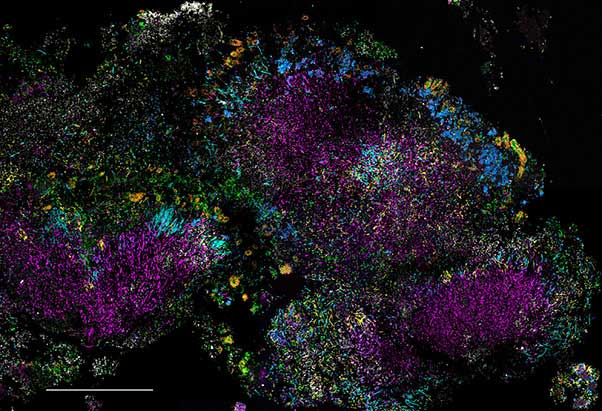The Microbiome Center continues its focus on the broader world of microbes

Nearly three years after its launch, the Microbiome Center doesn’t have a dedicated office or central lab facility. It doesn’t have a huge budget or grant-official academic titles, but it is staying true to its roots as a hub for like-minded scientists interested in exploring the world of microbes.
When asked if that made it something like a club or a fraternity, a joint effort of the University of Chicago, the Marine Biological Laboratory (MBL) and Argonne National Laboratory to capitalize on the growing interest. The announcement coincided with the White House Office of Science and Technology Policy’s National Microbiome Initiative to bring together public and private entities to advance research on microbial behavior and understand what constitutes healthy microbiome function.
We all think microbes are important in any context, so let’s bring together common approaches and methods to study them.
Like-minded centers popped up around the country, and early successes sparked immense interest in microbiome research, particularly around human health. In 2017, The Duchossois Group Inc. Chairman and CEO Craig Duchossois, his wife, Janet Duchossois, and The Duchossois Family Foundation gave $100 million to establish The Duchossois Family Institute (DFI) at the University of Chicago Medicine to accelerate research on how the human immune system, microbiome and genetics interact to maintain health. The DFI’s goal is to develop a “new science of wellness” that complements medicine’s traditional focus on treating disease by harnessing the body’s own defenses, including its relationship with microbes, to promote good health and prevent disease.
Pfister says the resources and research infrastructure being developed by the DFI are a tremendous boon for all researchers studying the microbiome at UChicago. The DFI’s emphasis on human health also allows the Microbiome Center to focus its efforts across many environments.
“We feel that our mission is to encompass microbes broadly: environmental microbes, microbes that are free-living, microbes that have symbioses with other organisms as well as humans,” she said. “We all think microbes are important in any context, so let’s bring together common approaches and methods to study them.”
For example, Pfister studies coastal ecosystems in the Pacific Northwest, including the relationships between aquatic microbes, plants and wildlife. Microbes play a role in the processes that absorb carbon and nitrogen from the atmosphere. Understanding how their metabolisms respond to increasing levels of carbon in the environment could provide crucial insight on coping with climate change.

Pfister and her co-director, David Mark Welch, PhD, an evolutionary biologist at the MBL, want to leverage the Microbiome Center as a way to foster collaborations across the three institutions. Research on climate change, for example, might include ecologists like Pfister, marine biologists from MBL, geologists from the university’s Physical Sciences Division, or computer scientists from Argonne. The center has developed undergraduate courses to teach students the basic tools for studying microbes. They are also soliciting pilot proposals from researchers who need help generating preliminary data for their projects to apply for external funding.
The Microbiome Center hosts a variety of meetings every year, including a research symposium on Tuesday, April 16 on the UChicago campus. The conference will bring together experienced microbiome researchers from UChicago, Argonne and MBL to meet with early career scientists, postdoctoral scholars and students to share essential methods and approaches to microbiome research. Libusha Kelly, a computational biologist and expert on marine viruses from the Albert Einstein College of Medicine, will be the keynote speaker.
That focus on the basic tools and techniques for studying microbes in any context is what Pfister says provides the link back to other microbiome research focused on human health.
“I sometimes feel like human health gets defined too narrowly. We also need to think a little harder about the origins of these microbes, how they evolve and how they affect where we live,” she said.
“So many of the methods to study environmental microbes, whether they're in the human environment or outside of it, have come from many different disciplines, not just the medical sciences. We know there are going to be contributions from diverse sources.”
The Microbiome Center
The Microbiome Center is an intellectual home for researchers across the University of Chicago, the Marine Biological Laboratory, and Argonne National Laboratory to advance understanding of the identity and function of microbes. The center supports the scientists who are investigating fundamental questions and developing new applications and tools to understand and harness the capabilities of microbial systems across different fields.
Learn more about the Microbiome Center